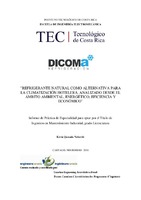Mostrar el registro sencillo del ítem
Refrigerante natural como alternativa para la climatización hotelera, analizando desde el ámbito ambiental, energético, eficiencia y económico.
| dc.contributor.advisor | Ing. Frank Marín Guillen | es |
| dc.contributor.author | Quesada-Valverde, Kevin | |
| dc.date.accessioned | 2019-03-22T22:15:47Z | |
| dc.date.available | 2019-03-22T22:15:47Z | |
| dc.date.issued | 2018 | |
| dc.identifier.uri | https://hdl.handle.net/2238/10458 | |
| dc.description | Proyecto de Graduación (Licenciatura en Mantenimiento Industrial) Instituto Tecnológico de Costa Rica, Escuela de Ingeniería Electromecánica, 2018. | es |
| dc.description.abstract | Among refrigeration systems, air conditioning equipment is the one that generates the most problems in terms of environment and energy. For this reason, maximizing the energy efficiency of these equipment and at the same time reducing the environmental impact generated by the operation, is considered a worldwide need. Taking this worldwide need, an air conditioning design based on a natural refrigerant such as propane was carried out, by means of a hydronic system that allows to satisfy the air conditioning needs of a hotel located in Liberia, Guanacaste. The design determines the cooling load, the sizing of pipes and ducts, equipment selection, generation of mechanical distribution plans and equipment budgets, based on ASHRAE design methods and own design parameters of DICOMA Refrigeration. An extensive analysis was carried out on the environmental, energy and financial impacts of using propane in an air-cooled chiller, compared to the most common refrigerants used in air conditioning, which are HFC-410A and HFC-134a. In addition, the feasibility of using a Heat Recovery unit installed in the chiller to preheat the water supply to 40 °C from the hotel hot water heater was analyzed, as well as the impact that the Recovery has on the dimensioning, energy consumption, environmental and financial impact on the electric and LP gas heater. With the design, a cooling shallow requirement of 88 tons of refrigeration was determined. By means of the analysis it was determined that the air-cooled chiller with propane as a natural refrigerant is the best option in the environmental field, reducing the carbon footprint for the operation of the equipment by up to 18% in the best of the cases equivalent to 5,95 Ton CO2 eq per year with respect to the equipment using HFC-410A and HFC-134a. With this reduction, the chiller complies with the Montreal and Kyoto Protocols and benefits the country's goal of being carbon neutral by 2021. By means of the energy analysis, it was concluded that the chiller with propane is the most efficient equipment among the equipment analyzed, with an EER of 16,0, reflecting an energy saving of up to 15% per year, generating an annual decrease in the payment for electricity consumption of ₡ 5 893 350. In financial terms, it was determined that, although the equipment with propane the operating cost reflects a decrease in the payment in the electric bill, the initial investment is very high with an initial cost of 1 354 USD/TR, on the other hand, considering only the initial investment the York equipment with refrigerant HFC-410a, is the best option with a cost of 494 USD/TR. Referring to the Heat Recovery, it is concluded that there is a reduction of 50% of the necessary capacity of the heaters, there are also savings in energy, environmental, quantity of equipment and financial. In terms of environment, the conclusion is that the electric heater is the best option with a saving of 72%, equivalent to 1,51 Ton CO2 eq. On the other hand, the LP gas heater is the best option in energy matters, saving up to 72%, generating an annual decrease in the payment of energy consumption of some ₡ 9 029 674, it is also concluded that, with a single equipment is necessary to meet the demand for power with a difference from the initial cost of the electric heater of about $ 5 324. | es |
| dc.language.iso | spa | es |
| dc.publisher | Instituto Tecnológico de Costa Rica | es |
| dc.rights | acceso abierto | es |
| dc.subject | Refrigerantes | es |
| dc.subject | Análisis | es |
| dc.subject | Ahorro energético | es |
| dc.subject | Calor | es |
| dc.subject | Calentadores | es |
| dc.subject | Consumo de energía | es |
| dc.subject | Aire | es |
| dc.subject | Carbono neutral | es |
| dc.subject | Eficiencia | es |
| dc.subject | Research Subject Categories::TECHNOLOGY::Engineering mechanics | es |
| dc.title | Refrigerante natural como alternativa para la climatización hotelera, analizando desde el ámbito ambiental, energético, eficiencia y económico. | es |
| dc.type | proyecto fin de carrera | es |


